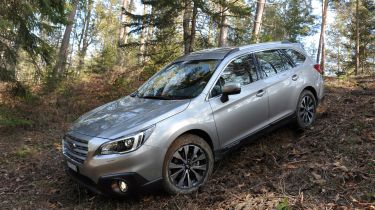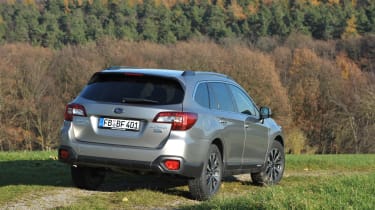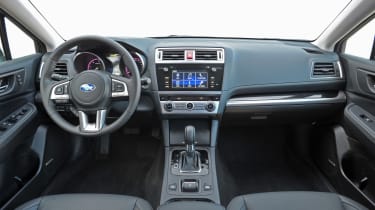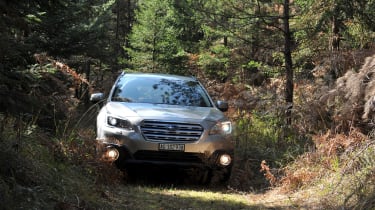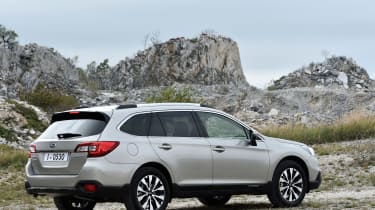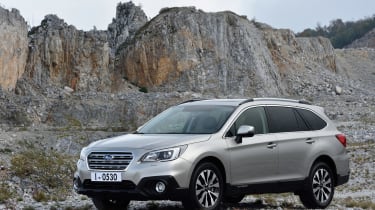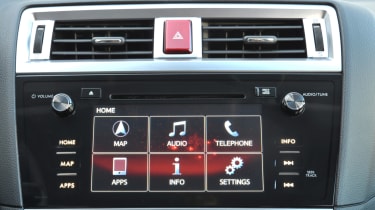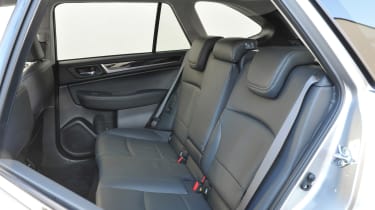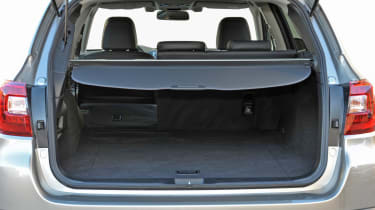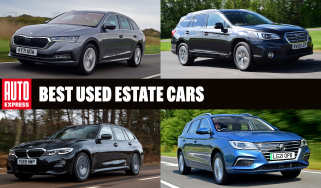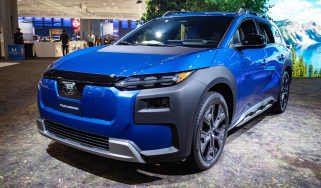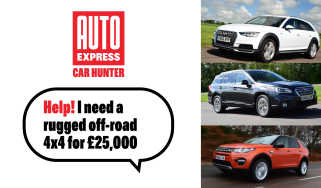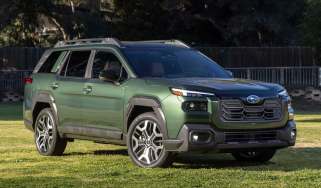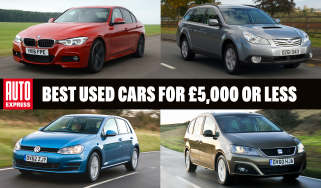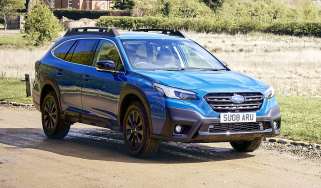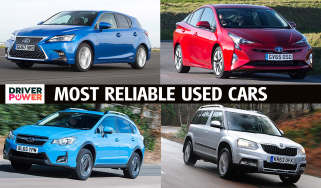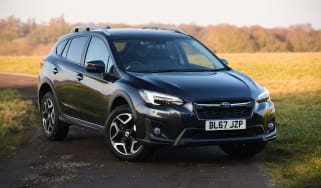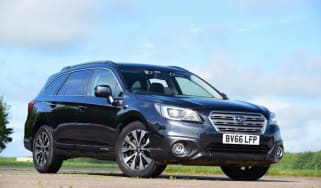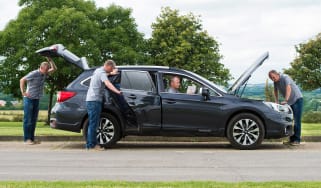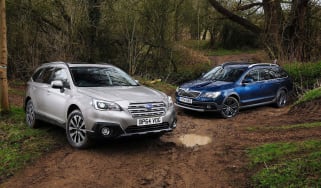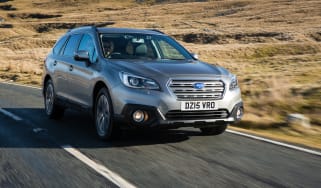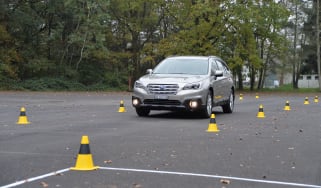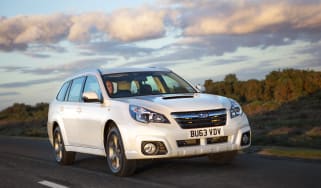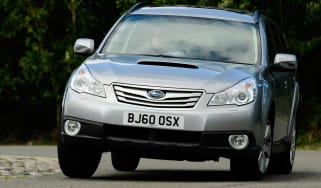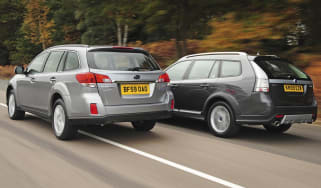Subaru Outback (2014-2019) review
Other off-road estates talk the talk, but the Subaru Outback is genuinely capable in the rough

Just so you know, this is an older review of the 2014-2019 Outback. If you are interested in information about a used Subaru Outback, or news about the latest Subaru models, please follow the links provided.
While the high-riding 4WD estate seems like a new fad with some car makers, Subaru has been at it with the Outback model for nearly 25 years. It's arguable that it was the first crossover, as it mixed the practicality of an estate car with the rugged looks of an SUV. While cars like the Toyota RAV4 and Nissan Qashqai came along to redefine what a crossover was, the Outback has continued in its own tradition, and has since been joined by similar high-riding estates.
The first Outback arrived in 1994, and was a development of Subaru's Mk2 family estate, the Legacy Wagon. Ever since, Subaru has produced a high-riding version of the Legacy estate. The current Outback went on sale in 2015, and it's the sole version of the Legacy that's sold in the UK today. Therefore it only carries the Outback name, with no reference at all to its Legacy heritage.
However, it's directly related to the Legacy Mk6 that's sold in other parts of the world (although that car is now only offered as a saloon), and it features plenty of traditional Subaru touches. There are horizontally-opposed boxer engines under the bonnet, while the four-wheel-drive system is a permanent set-up that sends power to all four wheels at all times, rather than the reactive 4WD systems seen in some rivals that only send power to the other wheels when it's needed.
Used - available now

2019 Subaru
Outback
55,200 milesAutomaticPetrol2.5L
Cash £18,099
2019 Subaru
Outback
47,520 milesAutomaticPetrol2.5L
Cash £19,599
2023 Subaru
Outback
33,689 milesAutomaticPetrol2.5L
Cash £25,699And the Outback gets the usual off-road estate styling cues, including raised suspension, black plastic cladding for the bumpers and door sills (although there aren't any plastic wheelarch extensions) and chunky roof rails.
In the UK, the Outback comes with a choice of two engines, a naturally aspirated 2.5-litre four-cylinder boxer petrol and a 2.0 flat-four diesel. The former comes with Subaru's Lineartronic CVT auto as standard, while it's a £2,000 option on the diesel, which gets a six-speed manual as standard.
There's a single trim offered, SE Premium, and as you would expect, it's loaded with kit, including a host of safety systems. Lineartronic cars get Subaru's EyeSight system that adds adaptive cruise control, autonomous emergency braking and lane keeping. Prices start at around £33,000, with the sole option - apart from the auto box on the diesel - is metallic paint at around £500.
The Outback is a fairly unique proposition on the new car market, as no other rival offers the same type of permanent 4WD that it comes with. Still, you can consider the Skoda Octavia Scout, Vauxhall Insignia Country Tourer and Volkswagen Passat Alltrack as rivals, as is the Audi A4 Allroad, although that's more expensive and none of these models will be as good as the Outback off-road. You should also consider the Outback if you're looking at crossovers and SUVs with four-wheel drive, but you need a car that can deliver genuine off-road ability.
Subaru is often overlooked here in the UK, but there is a loyal band of customers who have come to depend on the Outback's combination of rugged off-road capability and good-value pricing.
The curent Outback maintains that tradition but in a new and improved design that enhances the car’s premium feel. There’s also a welcome extra dose of on-road ability thanks to stiffer suspension.
• Best estate cars to buy right now
The Outback is very well equipped for the money, but the engines can be thirsty and residual values have yet to rise to meet those of more lifestyle-orientated brands such as Audi or Volvo. Still, as a comfortable and practical family workhorse, the latest Outback has a lot to offer.
Engines, performance and drive
Subaru has worked hard to transform the way the Outback drives, and in many areas has succeeded.
Changes to stiffen the suspension and damping have been implemented to cure the previous model’s wobbly driving characteristics. This brings a trade-off with a slightly harder ride, especially over the rough tarmac that many Outbacks will spend much of their time having to cope with in rural UK.
But these changes also means the handling feels more secure when you’re pressing-on through those country bends. On the road, the CVT gearbox keeps the 2.0-litre engine’s revs at around 2,000rpm, where peak torque is delivered. You can take control of the transmission’s seven ‘virtual’ ratios using the wheel-mounted paddles, but it’s so effective in auto mode that it’s best left to its own devices.
Refinement isn’t as strong as in an Audi A4 Allroad, but once the boxer unit is warmed up it’s rarely intrusive, while wind and road noise are kept to a minimum. Turn into a corner and you’ll discover the Outback’s steering lacks feel, but there’s a surprising amount of grip.
When the going gets tough, the Outback can easily mud-plug its way through slushy and craggy routes. It features an electronically controlled centre diff that can shift torque to the axle with the most grip; versions fitted with a six-speed manual get a conventional viscous coupling. For extra off-road ability, there’s also the X-Mode function that tweaks the traction control and activates hill descent control.
The X-Mode off-road system and 200mm ground clearance mean it inspires more confidence than other high-riding off-road estates, and can tackle obstacles that would normally be limited to dedicated SUVs.
Engines
As with all Subarus, the Outback is fitted with one of the brand’s trademark flat-four ‘boxer’ engines, which sends power to the permanent four-wheel-drive system through a continuously variable transmission. Called Lineartronic, it features seven ‘virtual’ ratios that are accessed using the steering wheel-mounted paddles.
Neither engine has particularly strong performance, but it’s the 148bhp 2.0-litre diesel that delivers the best package. It’s somehow quieter than the 173bhp 2.5-litre petrol under hard acceleration and has more punch, thanks to the 350Nm of torque available from low revs – the petrol engine makes 235Nm at best.
There’s a choice of a six-speed manual box, which suits the car's rugged character, or a CVT automatic – called Lineartronic – with the 2.0-litre diesel. The 2.5-litre petrol engine is offered with the CVT gearbox only.
A CVT-equipped car normally results in a droning driving experience, but Subaru has fitted seven ‘steps’ in the transmission to give the impression of the box swapping ratios. It works very well and is probably the best of its type on the market.
If you pick the 2.0 diesel with manual gears it will accelerate from 0-62mph in 9.7 seconds, or 9.9 seconds with the CVT gearbox. Top speeds are 124mph and 119mph respectively. Opt for the CVT-only 2.5 petrol and it will do the sprint in 10.2 seconds, while also raising maximum speed to 130mph.
When we tested the Outback with the 2.0-litre diesel and CVT box, it accelerated from 0-60mph in 10.4 seconds, which was a full 3.3 seconds behind the more powerful Audi A4 Allroad 190PS. That said, the Outback closed the gap during our in-gear tests, and was faster than the A4 from 50-70mph in sixth and seventh gears, thanks to its shorter 'ratios'.
MPG, CO2 and Running Costs
Subaru believes 60 per cent of new Outback sales will be the diesel – and it’s hardly surprising. It has relatively impressive claimed figures of 50.4mpg and it emits just 145g/km of CO2 – not bad for a ‘gas-guzzling’ 4x4.
Choose the CVT gearbox and the fuel consumption increases to 46.3mpg, while emissions rise to 159g/km, so automatic drivers will need to keep an eye on the road tax figures. The CVT diesel also costs a couple of grand more than the manual version up front.
Those figures put it on a par with an Audi A4 Allroad, comparing favourably with more conventional SUV rivals too. Smaller hatchback-based crossovers such as the Nissan Qashqai are the real winners here, though, managing figures closer to 70mpg in mixed motoring.
However, the Subaru is the stronger car off-road, and owners who need a rugged working vehicle may find such alternatives wanting.
The 2.5-litre petrol presents a conundrum for owners considering towing trailers, and don’t mind the added burden of a 40.4mpg combined test figure and 163g/km of CO2. The car is rated to tow 2,000kgs compared to the diesel’s 1,800kgs – although the diesel’s torque characteristics arguably make it a better bet if you don’t need the extra 200kgs in ultimate capacity.
Picking the petrol will save you £1,500 on the new price, and that’s before you’ve wrangled any discount out of your dealer.
It’s also worth noting that Subaru’s boxer engines have a reputation for being thirsty in day-to-day driving, so you can expect to be calling at the pumps a bit more regularly than the official figures imply.
Insurance groups
The cheapest Outback to insure is the diesel 2.0 SE Premium CVT, which falls into insurance group 19. Picking the manual gearbox causes that to jump to group 23, because the manual model doesn't come with the added safety of the EyeSight system. The 2.5-litre petrol model is in group 20.
Depreciation
While rugged Subaru 4x4s often made sense for farming types who bought new and ran their vehicles into the ground over many years of ownership, the depreciation picture for ‘ordinary’ users is not brilliant.
Predictions we’ve seen suggest the diesel Outbacks could retain around 35 per cent of their new cost after three years and 30,000 miles, but the petrol variants could easily do worse.
Interior, design and technology
As you’d expect, the Outback has plenty of tough-looking additions, including body cladding and a raised ride height. It has plenty of off-road presence, even if it doesn’t blend this with sleeker design cues.
This latest version boasts plenty of dark plastic body trim around the bottom of the bumpers and side sills to reinforce its 4x4 credentials. The headlamps are sharp, with an interesting LED running light design, and the big, gaping grille works with the Outback’s chunky lines.
Subaru’s designers have tried to finesse the car’s shape to improve the look and, complemented by bold rails, the roofline arcs back nicely to the rear, with a strong crease on the sides running into the tail-lights. However, there are still some awkward details, and at the back it’s quite bland and blocky, with a flat boot and simple rear lamps.
At first glance, the interior is a vast improvement on the old Outback’s, but beneath the surface there are a few annoying quirks. While the touchscreen infotainment system is relatively easy to use, the glossy screen shows up fingerprint smudges and reflects light badly, making it difficult to see.
There’s a mix of materials on the dash and centre console. The top of the dashboard is covered in soft-touch plastic, but lower down things are harder and feel cheap.
We’ve no complaints about the Subaru’s standard kit list, though – it includes cruise control, reversing camera, heated leather seats, keyless go, sat-nav and Bluetooth.
With the central touchscreen controlling many of the functions, the basic layout of the Outback’s centre console is clean. The dash has been decluttered and doesn’t look as busy as before, but it still feels dated.
There are two trim levels on offer – SE models come with automatic LED headlamps, cruise control, Active Torque Vectoring, 17-inch alloy wheels, heated front seats, electrically-adjustable driver’s seat and tinted windows, as well as a seven-inch touchscreen.
SE Premium models add a sunroof, keyless entry and push-button start, 18-inch alloy wheels, leather seats and a powered rear tailgate.
Sat-nav, stereo and infotainment
All versions of the Outback get Subaru’s Starlink infotainment system as standard. Based around a seven-inch touchscreen, it’s easy to operate and boasts graphics that are almost as crisp as you'll find in a VW.
The SD-based sat-nav is easy to programme and simple to follow, while the rest of the menus are logically laid out. This includes the Bluetooth facility, which allows you to make hands-free calls and stream music.
Android phone users can enhance connectivity using the Mirrorlink function, while the Starlink app gives access to online weather, news and music services. However, there’s no ability for the car to have its own 4G hotspot, while iPhone users will find the options to integrate their phones are limited.
There are some notable omissions, too. The most obvious is a lack of DAB radio, which means you have to rely on AM, FM or one of the online radio stations that you can access through the Starlink system.
Practicality, comfort and boot space
Given its estate car dimensions, it’s little surprise that the Outback scores strongly in this area. There's plenty of space inside for five adults – although there’s no facility for an extra row of seats - and the large glass area creates a bright and airy atmosphere.
Storage is generous, with plenty of cubbies, a large glovebox and decent door bins. A lidded cubby ahead of the gearlever contains USB ports and a 12V supply.
There’s plenty of adjustment for drivers of all shapes and sizes to get comfortable, while the raised driving position aids visibility of the road ahead. If you’re not a confident parker the standard rear camera will be a boon, and it will also be a reassuring feature if you plan to use your Outback for towing.
Size
The Subaru Outback measures 4,815mm long, 1,840mm wide and 1,605mm tall. This makes it noticeably bigger than the 4,721mm x 1,841mm x 1,495mm Audi A4 Allroad, and the 4,767mm x 1,832mm x 1,477mm Passat Alltrack.
The Volvo XC70’s dimensions are almost identical to the Outback at 4,838mm x 1,870mm x 1,604mm.
Leg room, head room & passenger space
Up front there are no issues at all, as the Outback provides plenty of leg and headroom. The driving seat has height adjustment as standard too.
In the rear the headroom should be fine for all passengers, but taller adults might find the legroom a little restricted. Child seat ISOFIX mountings are provided as standard on the outer two rear seats.
Boot
Opening the large tailgate reveals a usefully low loading lip (slightly lower than on the previous model). Estate car roots mean the Outback is as practical as an rival. Lower the rear seats using the boot-mounted handles and you’ll liberate 1,848 litres if space, which islarger than a VW Passat Alltrack. There are 559 litres with the rear bench in place – that's 80 litres less than in the VW, but there's deep underfloor storage and a powered tailgate.
The combination of grippy four-wheel drive and self-levelling rear suspension makes the Outback a first-rate towing vehicle – the petrol version can pull a two-tonne caravan, for instance.
Reliability and Safety
Choose an Outback with CVT transmission and it’ll come with Subaru’s ‘EyeSight’ technology. The company believes it’s the most advanced crash-preventing system on the market, and includes two cameras in front of the rear-view mirror that continuously scan the road ahead for obstacles and pedestrians.
It also features a lane departure warning system and adaptive cruise control, while Subaru claims it can actively prevent an accident at speeds of up to 31mph.
The focus on safety has paid off, as the Outback has been awarded a five-star rating in EuroNCAP's crash tests, with strong scores in all areas and maximum ratings in side-impact and 18-month-old dummy tests. Adult occupant safety is rated by the organisation at 85 per cent, child occupant safety at 87 per cent and pedestrian safety at 70 per cent.
The Volvo V70 – on which the XC70 is based – also has five stars, scoring 88 per cent, 84 per cent and 43 per cent when it was tested back in 2009.
All versions of the Outback come fitted with electronic stability control, six airbags, seat belt reminders and ISOFIX mountings for baby seats.
With the car only going on sale in 2015, there are no reliability ratings yet. But, with the fifth-generation car using well-proven mechanicals and Subaru’s reputation for strong and dependable cars, we have good reason to expect the car to rank well in the future Auto Express Driver Power surveys.
Subaru as a manufacturer ranked 12th in Driver Power 2015 – up four places on the year before, and ahead of brands such as Audi, BMW and Volvo.
Warranty
The Subaru Outback comes with a five-year, 100,000-mile warranty, which should alleviate any reliability concerns over the life of the car. The cover outclasses rivals, who mostly offer only three years and 60,000 miles.
Servicing
The Outback’s service schedule requires a visit to the dealership every 12 months or 9,000 miles.
This is more frequent than some rivals, which now offer flexible intervals that can extend up to two years, and the lack of any manufacturer-supported fixed ‘menu’ pricing means you could end up paying a bit more too.
There aren’t too many Subaru dealers around either, which could make life a little more complicated at times.
